Alice Coachman
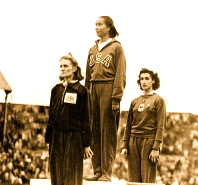
Alice Coachman – Gold Medal Moments
In 1948, Alice Coachman became the first African American woman to win a gold medal, after leaping 1.68 meters (5 ft 6⅛ in) in the finals of the high jump at the 1948 London Olympics. In this episode, civil rights icons Tommie Smith (1968 Gold Medalist) and Minnijean Brown Trickey (member of the Little Rock Nine), discuss how Coachman’s achievements were far more significant than just a gold medal in sports.
Alice Coachman, 90, Dies; Groundbreaking Medalist
By Richard Goldstein July 14, 2014
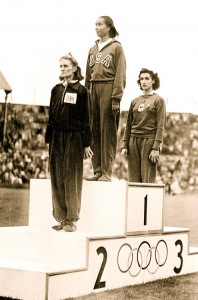 Alice Coachman of the United States, after winning the high jump at Wembley Stadium during the 1948 London Olympics. Credit Associated Press
Alice Coachman of the United States, after winning the high jump at Wembley Stadium during the 1948 London Olympics. Credit Associated Press
Alice Coachman, who became the first black woman to win an Olympic gold medal when she captured the high jump for the United States at the 1948 London Games, died on Monday in Albany, Ga. She was 90.
Her daughter, Evelyn Jones, said she had been treated at a nursing home for a stroke in recent months and went into cardiac arrest after being transferred to a hospital on Monday with breathing difficulties.
Coachman (who was later known as Alice Coachman Davis) received her medal from King George VI. She was invited aboard a British Royal yacht, she was congratulated by President Harry S. Truman at the White House, and Count Basie gave a party for her. She was lauded in a motorcade that wound its way through Georgia from Atlanta to her hometown, Albany.
But she had returned to a segregated South. Blacks and whites were seated separately in the Albany city auditorium when she was honored there. The mayor sat on the stage with her but would not shake her hand, and she had to leave by a side door.
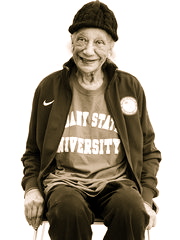 Coachman in 2012.Credit Damon Winter/The New York Times
Coachman in 2012.Credit Damon Winter/The New York Times
As a youngster in Albany, she had run and jumped barefoot, using ropes and sticks for makeshift high jumps. She had not been allowed to train at athletic fields with whites.
“You had to run up and down the red roads and the dirt roads,” Coachman told The Kansas City Star. “You went out there in the fields, where there was a lot of grass and no track. No nothing.”
At a time when there were few high-profile black athletes beyond Jackie Robinson and Joe Louis, Coachman became a pioneer. She led the way for female African-American Olympic track stars like Wilma Rudolph, Evelyn Ashford, Florence Griffith Joyner and Jackie Joyner-Kersee.
“I made a difference among the blacks, being one of the leaders,” she told The New York Times in 1996. “If I had gone to the Games and failed, there wouldn’t be anyone to follow in my footsteps. It encouraged the rest of the women to work harder and fight harder.”
Alice Marie Coachman, one of 10 children, was born in Albany on Nov. 9, 1923, to Fred and Evelyn Coachman. She ran track and played baseball and softball with the boys when she was young, but her father, a plasterer, was angered by her refusal to be ladylike and sometimes whipped her for pursuing athletics.
She saw little prospect of an athletic career and thought of becoming a musician or a dancer, having been enthralled by the saxophonist Coleman Hawkins and by Shirley Temple. But she was encouraged by a fifth-grade teacher and an aunt to continue in sports, and she came to the attention of the Tuskegee Institute in Alabama while competing for her high school track and field team in Albany.
Coachman moved to Tuskegee and competed for the institute’s high school and college teams and later for Albany State College (now Albany State University). She captured the Amateur Athletic Union high jump championship 10 consecutive times, from 1939 to 1948, and the union’s 50-meter outdoor title from 1943 to 1947. She also won national championships in the 100-meter dash and the 4×100-meter relay.
But Coachman had to wait until 1948 to compete in the Olympics; the 1940 and 1944 Games were canceled because of World War II. On a rainy afternoon at Wembley Stadium in London in August 1948, she vied for gold in the high jump with Dorothy Tyler of Britain. They both cleared 5 feet 6 1/8 inches, but Coachman won because she did it on her first try. Micheline Ostermeyer of France was third.
Coachman, the only American woman to win gold in track and field at the London Games, remembered the moment long afterward.
“I saw it on the board, ‘A. Coachman, U.S.A., Number One,’ ” she told NPR. “I went on, stood up there, and they started playing the national anthem. It was wonderful to hear.”
Coachman’s track and field career ended with the 1948 Olympics, when she was 24. She raised a family, became an elementary and high school teacher, and created the Alice Coachman Track and Field Foundation to aid young athletes and former competitors in financial need.
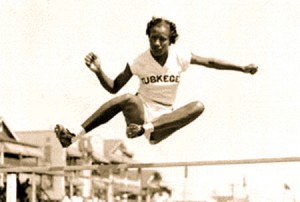 Albany native Alice Coachman, the first black woman to win an Olympic gold medal, died Monday at the age of 90.
Albany native Alice Coachman, the first black woman to win an Olympic gold medal, died Monday at the age of 90.
http://www.albanyherald.com/news/2014/jul/14/albany-track-field-legend-alice-coachman-dies/
She is survived by her daughter and a son, Richmond, from her first marriage, to N. F. Davis, which ended in divorce; a sister, Dicena Rambo; one grandchild; and two great-grandchildren. Her second husband, Frank Davis, died about five years ago, her daughter said.
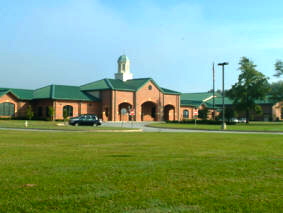 Alice Coachman Elementary School in Albany
Alice Coachman Elementary School in Albany
Coachman was inducted into the United States Olympic Hall of Fame and the National Track and Field Hall of Fame. There is an Alice Coachman Elementary School in Albany.
Coachman faded from public view after the 1948 Olympics, but her pride remained undiminished.
“Go anyplace and people will tell you Wilma Rudolph was the first black woman to win a medal — it’s not true,” she said in an interview with The Birmingham News in 1997, referring to Rudolph’s three gold medals in the sprints at the Rome Olympics. “She came on the scene 12 years later. But she was on television.”
http://www.nytimes.com/2014/07/15/sports/alice-coachman-90-dies-groundbreaking-medalist.html?_r=0

